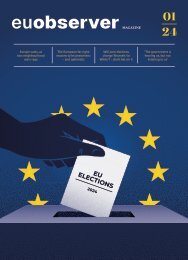European Parliament Elections 2019
It is difficult to acknowledge you don't know something. A few months ago, several thousand Europeans were asked hundreds of questions for the Eurobarometer poll. One of those questions was: "Do you agree with the statement: 'I understand how the EU works'." Only 10 percent totally disagreed with that statement. Another 29 percent "tended to disagree". Peculiarly, three percent said they did not know whether to agree or disagree.
It is difficult to acknowledge you don't know something. A few months ago, several thousand Europeans were asked hundreds of questions for the Eurobarometer poll. One of those questions was: "Do you agree with the statement: 'I understand how the EU works'." Only 10 percent
totally disagreed with that statement. Another 29 percent "tended to disagree". Peculiarly, three percent said they did not know whether to agree or disagree.
You also want an ePaper? Increase the reach of your titles
YUMPU automatically turns print PDFs into web optimized ePapers that Google loves.
French far-right leader Marine Le Pen (r), who met Putin in Moscow, has also vowed to defend white Europe and orthodox values<br />
Photo: kremlin.ru<br />
This 'satan' was meant to be Barack Obama, the then<br />
US president, who is black, and the West more broadly<br />
speaking.<br />
The embryo was meant to be the pro-EU revolution in<br />
Kiev earlier that year - the Euromaidan, which Russia<br />
blamed on Western conspiracies.<br />
The Crimea pageant was broadcast on Russian TV<br />
and was meant primarily for a Russian audience.<br />
"In terms of Europe, it came in 2013, when France<br />
legalised same-sex partnerships, and French far-right<br />
politicians, such as Marine Le Pen, started coming to<br />
Russia, giving speeches on how wonderful Russian<br />
civilisation was," Snyder said.<br />
"It's at that moment that this Russian idea - that we're<br />
going to protect Europe from itself, that we're going to<br />
protect heterosexuality from homosexuality - starts to<br />
become foreign policy," he added.<br />
But it was part of a wider anti-EU campaign which uses<br />
similar sexual motifs.<br />
It also showed Ukraine was a front line between Russia<br />
and the West not just in military terms, but in terms of<br />
a culture war.<br />
"There was a moment in Russian politics in 2010 or<br />
2011, when Russia gave up on becoming a <strong>European</strong>type<br />
rule-of-law state and moved instead into what<br />
Putin called Eurasia, where the issue is not what we<br />
can do, but who we are, and who we are is supposedly<br />
straight and white," Timothy Snyder, a historian at Yale<br />
University in the US, told EUobserver in January.<br />
CRUCIAL MOMENT<br />
The <strong>European</strong> <strong>Parliament</strong> vote will be of special interest<br />
to Russia, its EU embassy in Brussels told EUobserver.<br />
"The EU elections in May are of crucial importance ...<br />
for the future of Russia-EU relations," it said.<br />
"All key Russian media ... will continue to cover political<br />
processes in the EU in the broadest possible range,"<br />
it added.<br />
Russia denies trying to foment hostility to the EU, or<br />
targeting minorities.<br />
The culture war against the EU began shortly afterward,<br />
said Snyder, who chronicled the developments in his<br />
new book, The Road to Unfreedom.<br />
"While covering such sensitive themes, they [Russian<br />
media] have to comply with the provisions of the<br />
constitution of the Russian Federation, which states

















